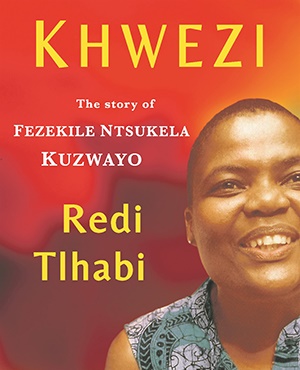
On 15 October 2016 a small group of people gathered in Durban to celebrate the life of their friend, who had passed away after a long illness at the age of 41.
It had been a struggle to find a church to have her memorial, as political forces did everything possible to prevent a dignified service for the woman. After some effort, with the help of activists and friends, the somewhat run-down inner city Methodist Church was secured for the service.
The church, with its long history of serving Durban’s marginalised and abused, ended up being the perfect place to bury Fezekile Ntsukela Kuzwayo.
Fez, as she was affectionately known to her friends, was many things: a loyal friend, Aids activist, teacher, singer and devoted daughter. She was also the woman who accused Jacob Zuma of rape. She was Khwezi.
And so when roughly 600 people showed up on Wednesday for the launch of Redi Tlhabi’s book, Khwezi, it was a triumph; confirmation that while her life met a humble end, she was a hero to many.
As one friend remarked on Facebook, it was the book launch black women deserve.
Khwezi’s story comes at a time when our public discourse is flooded with accounts of rape, sexual abuse and violence against women and children.
It’s as if the dam wall has burst and heartbreaking stories are suddenly everywhere – on the radio, in the news, on our front pages.
Evidently, Fezekile’s story is the story of our country.
It’s the story of broken families and the moral ambiguity of a generation caused by forced segregation and exile. It’s the story of shattered dreams and children being prematurely exposed to the brutal realities of life, caused by poverty, illness and unstable support structures.
It is about a culture of sexual impunity and rape that have taken root among our men, but have been denied because it goes against the heroic narrative of the struggle against apartheid. It is a story of disenfranchised men desperately trying to assert their power by avenging themselves on the bodies of women.
It’s also the story of how the public irrevocably influences the private and the indisputable link between rape and politics.
Tlhabi, who became close friends with Fezekile over the course of writing the book, illustrates this beautifully by letting her tell her own story by way of diary entries, court transcripts and the recorded conversations between the two of them.
For the first time we get to know the woman behind Khwezi as someone with dreams of becoming a teacher, who had a beautiful voice and loved to sing; who wore her heart on her sleeve and trusted too easily.
We see how all of this changes when her father dies in exile when she is just 9 years old, forever influencing her relationships with men and perhaps leading her to seek the father figure in Zuma that he never intended to be.
She is raped three times, when she is five, 12 and 13 years old, by uncles and family she trusted and in whose homes she grew up. When she later reports the Zuma incident, it is her aunties and uncles who try to dissuade her from going ahead with the charge in the interest of "the movement".
In an irony so tragic it moves you to tears, Adv Kemp J Kemp for Zuma argued during the trial that because of her previous allegations of rape, her version of events could not be trusted. No regard was given to the fact that she was a child when the previous incidents took place.
Which is the reason that this is also the story of a justice system that, even now, 23 years later, is failing victims of rape and sexual violence.
Fezekile ended up being every bit as much on trial as Zuma. Her sexual history was dissected in ways that legal experts until this day say is unheard of. She was humiliated and discredited. She had to go into a witness protection programme, assume the name Khwezi and was ultimately forced to flee the country.
In a country where research has shown than only one in nine rape survivors report the attack to the police, and between 4% and 8% of accused rapists are convicted, Khwezi became the reason why every woman who is raped by a powerful man in future will think twice before laying criminal charges.
A huge contributing factor to this is the limitation of the legal system to appreciate the politics of power and how they are skewed in favour of men.
In this regard, Tlhabi’s book poses weighty questions to those of us who confidently rely on the judicial system to serve justice to the poor and desolate.
Are our courtrooms attuned to the nuances of cultural practices and language when adjudicating matters that are to a large part informed by them? Has the system dealt with society’s constructed power relations? Or are these relations perpetuated by the adversarial, abusive and often grotesque language used in an attempt to find legal truths at all costs?
It also poses interesting and crucially important legal questions around rape, like what it means to give consent to sex when the relationship between the two parties isn’t equal.
Finally, it forces us to contemplate that which we already know, but are uncomfortable acknowledging: the fact that we are a nation led by a man who lacks moral authority and is willing to exploit even the most vulnerable in society to get what he wants. What does that say about us?
With this book, Tlhabi rewrites Khwezi and lets her speak from the grave to address the countless survivors of rape and sexual violence in South Africa to remove, on their behalf, the burden that masculinity has placed on all victims of rape and injustice.
By showing up in their hundreds to the book launch, they have responded to pay tribute to the woman willing to sacrifice her life on their behalf.
Khwezi: The story of Fezekile Ntsukela Kuzwayo by Redi Tlhabi
Jonathan Ball Publishers
242 pages
R175 from takealot.com




 Publications
Publications
 Partners
Partners











